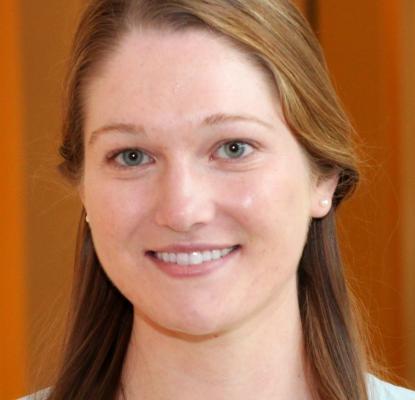Lisa Tostanoski
Lisa Tostanoski’s favorite subjects while growing up in Catonsville, Maryland were always math and science. She especially enjoyed an advanced-placement chemistry class as a student at McDonogh School, in which the teacher balanced classroom learning with hands-on experiments and activities, such as synthesizing biodiesel fuel and making ice cream. It wasn’t surprising that she decided to study biomedical engineering in college.
An extracurricular activity involving a sports injury prompted Lisa to focus on healthcare research. A competitive swimmer since age 5, Lisa had earned a spot on the varsity swim team at Bucknell University, but during her sophomore year, she learned that she needed surgery to address a chronic shoulder injury. Determined to return to swimming, she underwent five operations and many hours of physical therapy while simultaneously exploring how bioengineering technology can promote healing. Those experiences helped her formulate a career goal of directing an academic research lab emphasizing highly translatable, clinically-focused projects, while promoting education in the STEM fields (science, technology, engineering, and mathematics).
Lisa was an undergraduate researcher in the biomedical engineering department at Bucknell University and a summer intern in the Orthobiologics Lab at Union Memorial Hospital in Baltimore. She received a bachelor’s degree in biomedical engineering in 2012, graduating magna cum laude with recognition from Tau Beta Pi, the national engineering honor society.
Currently, she is a National Science Foundation Graduate Research Fellow in the Jewell Research Lab at the University of Maryland. Her projects focus on applying nanotechnology to address an ongoing healthcare problem: a shortage of effective therapies for autoimmune diseases, such as multiple sclerosis. Under the guidance of her doctoral advisor, Professor Christopher Jewell, Lisa has led two projects that use bioengineering to study and promote immune tolerance. Her initial findings helped to nucleate ongoing collaborative efforts, bringing together engineers from the Jewell Lab and clinical collaborators from the University of Maryland School of Medicine and the Department of Veterans Affairs Multiple Sclerosis Centers of Excellence – East. Together, the multidisciplinary research team is working to develop new therapies that could control autoimmunity, but minimize the side-effects that plague current clinical interventions. Lisa is listed as an inventor on five intellectual-property filings and has published 14 papers, won numerous awards, and delivered presentations at seven national and international conferences.
Ms. Tostanoski has worked toward her goal of promoting STEM education through a National Science Foundation-funded effort she helped create in the Jewell Lab called the Program to Enhance Participation in Research (PEPR). This program has exposed more than 500 local high school students to biomaterials, vaccines, and scientific research. In particular, Lisa has directly mentored four high-school students over year-long bioengineering projects and co-led several day-long workshops. In the lab, Lisa has also formally mentored three undergraduate researchers, one of whom received a Howard Hughes Medical Institute Undergraduate Fellowship. She expects to receive her Ph.D. from the University of Maryland Fischell Department of Bioengineering in mid-2017.


